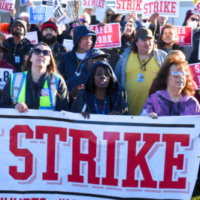Washington, DC—The National Employment Law Project (NELP) commends the U.S. Department of Labor (DOL) for its final rule to strengthen and expand overtime protections for more workers across the country. This rule is an important step toward addressing the extremely low salary threshold set in 2019 by the last administration and upholding the overtime law’s purposes. By increasing the number of workers who will be automatically entitled to overtime compensation, DOL will both help bring relief to workers struggling to make ends meet due to the rising cost of living and give workers back some of their hours to be used for their own personal time rather than work.
We commend DOL for quickly adjusting the current threshold simply to account for inflation since it was last updated in 2019, bringing the salary threshold to $43,888 per year ($844 per week) as of July 1, 2024. This will at least restore the vitality of the current, but insufficient, overtime regulation for approximately 1 million workers. And as it does no more than restore the status quo of the last overtime regulation, which was never challenged by any employers, associations, or other entities, employers should be able to easily adapt to this first step of restoring overtime rights.
Then, by raising the salary threshold to $58,656 per year ($1128 per week) on January 4, 2025, DOL will ultimately provide new and enhanced protections for approximately an additional 3 million workers who are working more than 40 hours per week for no additional compensation. By updating this salary threshold every three years, DOL will ensure that overtime protections do not stagnate, that they are aligned with routine cost of living increases for workers, and that employers will have the predictability of regular modest adjustments to overtime eligibility that they can plan for year to year.
“Once again, the Biden Administration is listening to workers by taking these much-needed steps to restore overtime protections for millions of workers,” said Rebecca Dixon, president and CEO of NELP. “The share of workers guaranteed overtime pay when they work more than 40 hours a week has plummeted since the 1970’s as the salary threshold has eroded with inflation. Workers will be grateful for the long-overdue protections this updated rule will provide.”
The new overtime rule will help workers in two important ways. It will put more money into the pockets of employees whose employers continue to have them work in excess of 40 hours per week. This not only bolsters workers’ lives and communities, but it also fuels economic growth.
Equally important, the restored protections will incentivize employers to limit work weeks to 40 hours, restoring work-life balance and allowing employees to reclaim time for their families and personal needs. The Fair Labor Standards Act’s overtime protections were enacted to spread employment among more workers in this way, rather than overworking those already on the payroll. The new rule upholds the FLSA’s intentions.
Rather than relying on unpaid or off-the-clock overtime hours, businesses may now choose to reassess workloads, consider hiring additional staff, and/or convert part-time workers to full-time. This shift will foster both a healthier work-life balance and an environment where employees are compensated with fair pay, which can also result in new hiring.
Though this new rule will have far-reaching positive effects on the lives of workers across the country, by setting the annual salary threshold at only $58,656, and pegging the threshold to the lowest cost of living region in the country, DOL has proposed a modest threshold by historical standards, and one that is lower, in inflation-adjusted terms than the threshold DOL attempted to implement in 2016 under the Obama administration.
The modest nature of this proposed rule demonstrates the need for Congress to step up and provide the full measure of overtime protections that workers need. NELP calls on Congress to take up the Restoring Overtime Pay Act, championed by Senator Sherrod Brown (D-OH) and Representative Mark Takano (D-CA), and to finish the job that DOL is starting.



